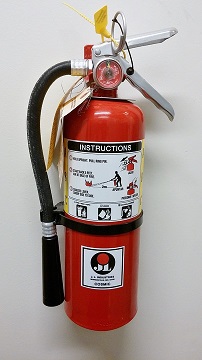Summer and fall are a great time for fun, game day parties, and backyard BBQ’s. I enjoy a good party (who doesn’t?) but often times we can be too busy having fun and not be prepared for possible dangerous situations. Recently, I was at a party when the atmosphere quickly changed from fun to scary. It turns out that a flammable material was put into the oven that ignited into a blaze. Things happened so fast it felt like no one had time to react. The homeowner quickly pulled out a fire extinguisher and put the fire out. She was so apologetic and embarrassed about the mess from the extinguisher, but all I could think that this situation could have been very different. The house wasn’t damaged and no one was hurt.
I started to wonder what would I do if a similar situation happened at my house, would I be prepared? Or just sit there watching the blaze and wait for the fire department to show up? Do I have the knowledge and tools to handle a small fire and prevent it from becoming something much larger? Although most people have common fire knowledge, such as knowing the difference between putting out a regular fire vs. a grease fire, it turns out, most people don’t even have fire extinguishers in their home.
Here are a few tips to prepare you and your family for a fire-big or small in your home.
- If a fire should start, obviously the first thing to do is to get everyone out of the house safely and call 911 if it’s larger than you feel you can handle.
- Fire extinguishers should be placed in areas that are accessible within seconds. Place them in easy-to-grab spots, near exits. The National Fire Protection Association recommends having at least one fire extinguisher on every floor of the home. The first location should be the kitchen.
- Smoke Detector batteries should be replaced every year, tested every month, and completely replace every 10 years. The National Fire Protection Association recommends homes should have smoke alarms installed inside every bedroom, outside each sleeping area and on every level of the home, including the basement. So that means a 2 story, 3 bedroom house needs a minimum of five smoke alarms.
- Every family should have a clearly discussed Fire Escape Plan –and young kids should know how to dial 911, and their address in case they are the ones making the emergency call.
- Bedroom doors should be closed before going to bed. That simple choice could mean life or death in the event of a house fire, as a closed door can significantly slow the spread of flames, reduce toxic smoke, improve oxygen levels, and decrease temperatures.
Fire safety is so important, yet often over-looked! Hopefully these tips can help your family stay safe this season.


Recent Comments